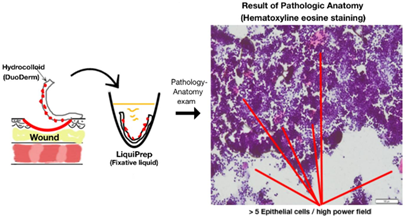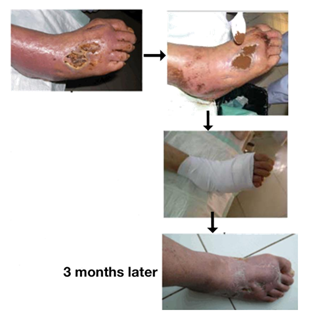eISSN: 2576-4497


Mini Review Volume 1 Issue 4
School of Medicine, Universitas Padjadjaran, Indonesia
Correspondence: Hendro Sudjono Yuwono, School of Medicine, Universitas Padjadjaran, Bandung, Jalan Eijkman 38, Indonesia
Received: June 11, 2017 | Published: October 23, 2017
Citation: Yuwono HS. The new paradigm of wound management: a must to follow. Hos Pal Med Int Jnl. 2017;1(4):97–99. DOI: 10.15406/hpmij.2017.01.00023
Humans have been using coffee powder for over a hundred years to manage wounds. Here will be explained the historical reason why to use it for wound management and scientific explanation that raised it as new thinking in wound management.
Keywords: coffee powder, wound dressing, wound management, new paradigm
MRSA: Methicillin-Resistant Staphylococcus Aureus
The history of wound management begins with an empirical treatment experience based on the experiences of others in the way to overcome bleeding. Wounds are a problem that must be overcome by man for the rest of his life, because the ability of humans to cope with injuries is a skill to survive. From a long time, humans saw that wounds in animals could heal itself, so that people understand the dominant natural factors in healing. Following that man understands that a healthy body (microcosmic nature) can cure illness. Humans have a tendency to treat common diseases and wounds in particular instinctively using materials derived from plant foods which has the ability to speed healing.
Hippocrates, the father of medicine has suggested with his historical famous statement:
"Make your food your medicine." His remarks indicate that food should provide physical strength and speed healing. Several types of herbs, according to empirical experience, have been known to have these abilities. In historical knowledge has been known for a long time about herbal medicine, which comes from medicinal plants, has properties to help strengthen the immune system and speed healing. The experience of trying various herbs finally found the proper way and dose empirically in the treatment of wounds, which is called local wisdom that developed into traditional medicine and known to be a community culture. In historical records known to humans using turmeric, honey, coffee as ancient herbs to treat wounds that are satisfactory results because this method supported in antimicrobial activities, the reduction of pain, inflammation, and swelling. The history has been going on long before using humans using sterile gauze and fluid, or modern wound dressing which is a result of the advancement of industrial society progress beginning in the 19th-20th century.
The development of synthetic wound dressing in the world
The development of scientific progress in the world to explain the wound healing phenomenon that occurred earlier raises a new understanding that explains the modern wound treatment. In 1962 the concept of winter which states the mood of a moist wound bed was an essential condition of wound healing. Although there are other things more important such as ischemic problems, blood sugar levels, and other influential comorbidities. The problem that is considered necessary in wound healing is the production of wound fluids, so that many products in the market nowadays are based on the category of wound fluid productivity. Attention is considered excessive is the number of the goods based on the problem of wound fluid to the effort of the absorption of wound fluid by using the system of wound sores (negative pressure wound therapy). The product, of course, makes the price expensive and the cost of wound care to soar and because it must be handled by experts as well as in hospital stay care.
Wound management refers to its history that has been running naturally for hundreds of years is based on the principle: ‘Firstly do no harm’ and ‘Cooperate with the laws of nature’ is still relevant today.1 The long time indicates an undeniable positive experience by anyone regarding its effectiveness in the treatment of wounds. Mainly coffee is used not only wound dressing but also to remove the wound odor quickly.2 This coffee capability is the only one that no other has! Animal wounds show it, which allows nature to heal by eating according to its natural diet. The acute wound in humans should be treated without causing new trauma repeatedly resulting from washing and rubbing are repeated periodically done. Such adverse action is exacerbated by frequent replacement of wound dressing.
Replacing one of the modern wound dressings proved to cause many epithelium to be lifted because it attached to the base of the wound cover.3 The Delidios Arimbi4 study confirms the change in pH of the wound bed from 4.0-4.5 to 5.0-6.0 with saline-washed wound (0.9%NaCl solution) when washing the wound, causing surrounding skin bacteria flow into the wound area.4 Newly grown cells on the wound bed become susceptible to damage due to washing and scrubbing, especially when done with high frequency susceptible to trauma that will slow the healing and cause the healing with an abnormal scar. Damage to the layers of cells on the surface of the wound bed is predicted to be susceptible to high-pressure aspiration on the NPWT method. The incident also given that the new cells grow on the surface of the wound is still young, not fixed, still quickly released and fragile. The cells in the suction can be carried along with the wound fluid. That is an objection to the manipulation that is seen t be overreacting to the wound bed and the consequence of high-cost issue. Wound management in a natural way continues today using honey, coffee, turmeric, because using it is a simple procedure, easy to make, cheap, good availability, nontraumatic, and efficient.5,6 Also the natural wound dressing can absorb wound fluid, a potent antimicrobial, effective anti-inflammatory function.2 They have a rapid healing ability because they do not interfere with the cell growth of wound beds, and act as antioxidants that assist the role of growth factors physiologically. Strengthens and stimulates the function of PMN leukocytes, macrophages, and cooperates with cytokines, along with enzymes MMP and TIMP as autolytic debridement activities. Coffee has a strong antibacterial capacity through its H2O2 and becomes a hyperosmolar fluid when mixed with wound fluid. Experience in using coffee for acute wounds (trauma of a traffic accident, burst wound after amputation) or chronic type 2 diabetes mellitus injury) states that dressing changes can be done for longer to 3-4 weeks. In that time the cells can grow healthier because they do not get interference from changing dressing, washing or rubbing because it will not be done (Figure 1 & 2).

Figure 1 Hydrocolloid (Duoderm) as the wound dressing was used and replaced once every day. After the dressing lifted up, then it put into the fixative liquid of LiquidPrep for pathologic examination which then resulted in >5 epithelial cells per high power field.3 It has proved the frequent dressing change will lift up the superficial cells.

Figure 2 Three chronic diabetic wounds at the dorsum of right foot treated using coffee powder and closed by gauze wrapping, and the blood glucose control using insulin injections.3 The coffee and gauze changed every 2-3 weeks without washing and rubbing, then the wounds closed with skin on three months later.
In fact, although debridement was only one time in the beginning for dirty category wounds, then without washing the wound or debridement again, and without cleansing from the remaining dressing that is still attached, closing the skin was formed faster and scar normally.
Coffee has a stronger antibacterial capacity as shown by its water extract zone of growth inhibition against methicillin-resistant Staphylococcus aureus (MRSA) in a laboratory experiment in comparison with 3% povidone-iodine solution and Argentum sulfadiazine cream.2 The new wound dressing groups made in the factory (modern wound dressing, tulle, ointment/cream and gauze) have no antibacterial ability, except those containing antibiotics (e.g. neomycin, chloramphenicol) or antiseptic (e.g. povidone-iodine). Coffee does not only has antibacterial properties, it also has anti-inflammatory properties, antioxidants.7 For a human, coffee is a food or drink would be more profitable in tolerance.
The clinical experience of using coffee for wounds since 2003 and based on experimental studies experience in animals and human study affirms its superiority compared to the modern wound dressing.2,8 The experience of witnessing positive responses of the sufferer while wearing coffee to cover the wound, which previously used modern wound dressing, is very encouraging.2 The task of the scientist in the contemporary world is to explain the effectiveness of traditional wound dressing scientifically is indeed challenging to imitate and rivaled by synthetic modern wound dressings which have just 1-2 years experience.
It concludes that compared to the modern wound dressing the traditional paradigm of wound management has been shown to have a natural advantage in the speed of wound healing without causing pain, cost-effective, deodorize, and still relevant to use today.
None.
The author declares no conflict of interest.

©2017 Yuwono. This is an open access article distributed under the terms of the, which permits unrestricted use, distribution, and build upon your work non-commercially.